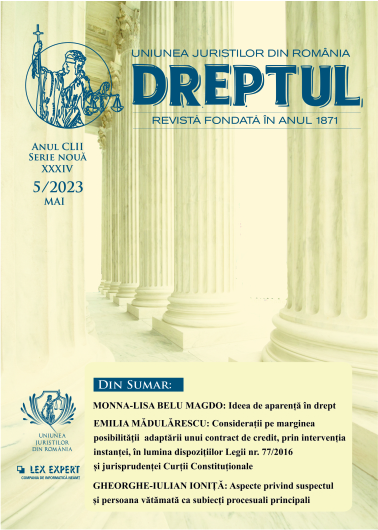Ideea de aparență în drept
The idea of appearance in law
Author(s): Monna-Lisa Belu MagdoSubject(s): Civil Law
Published by: Uniunea Juriștilor din România
Keywords: appearance in law; exception from the effects of nullity; original and subsidiary way of acquiring property; common and invincible error; good faith; effects of appearance in law;
Summary/Abstract: The objective of the study is to outline the operating mechanism of the principle of the validity of appearance in law as an exception to the principle resoluto iure dantis resolvitur ius accipientis, to which there are associated the principle of retroactivity, that of restitutio in integrum and the principle nemo plus iuris ad alium transferre potest quam ipse habet. The rule according to which no one can transfer more rights than he has, laid down in Article 17 of the Civil Code, under the incidence of the common and invincible error and of the good faith of the acquiring third party, will designate, according to the theory of appearance, both a way of acquiring the subjective rights and of saving the act from the effects of nullity, if its cancellation does not create prejudices to the third party. The appearance in law, as an exception to the retroactive effect of nullity, has an action limited by the subsistence of its reasoning, which justifies the annulment of the act, if it is not transposed for the third party in a sanction causing prejudices. The theory of appearance brings into discussion whether the right of the acquiring third party can arise from the appearance of the right, reflected in the common and invincible error with regard to the alienating party, as if he is the owner of the right transmitted and in the good faith of the acquirer. The error communis facit ius principle, which gives expression to the appearance, must be used with caution and in a subsidiary manner, being an exception that cannot restrict the scope of application of the principle from which it derogates. The effects of appearance that save the act from nullity are ensured by the techniques of the non-opposability of the hidden situation towards the third party misled by appearance and those of extending the binding effects of the contract towards the true holder of the right, bound to recognize the legal transaction concluded without his consent. In the analysis of apparent real estate property, there have been examined the characters of the translative act from non dominus to the acquiring third party, the characters of possession, as a material element of the appearance, likely to create the intellectual reflex in the conscience of the third party and of the community in the form of the common and invincible error, the role of the property title of the alienating party and of its tabulation, in creating the belief of the good faith third party in the real existence of the right attested by these operations. As regards the appearance of the right, the role of the notoriety of its persistence and constant in defining the common character of the error was specified. Not to be confused with the invincible error shared by everyone, the common error may be actual for some members of the community and potential for others, unlike third-party acquirer error, which must always be actual to excuse his mistaken belief in invoking good faith. The error must be not only common, but also invincible, and the invincibility of the error also applies to the third party, in order to benefit from the subsidiary and exceptional situation of appearance in law. Invincibility, in both its manifestations, must be of the calibre of a true force majeure. The generality of the error, analyzed in the study also from the subjective perspective of the perspicacity and prudence of the middle man, emphasizes the qualitative component, and not only the quantitative component of the common error. The good faith of the third party acquirer must be effective and demanding and the invincible character of his error and of the community must exist at the time of the conclusion of the contract, under the conditions of a persistent, constant appearance free of ambiguities and contradictions. We can say that the good faith of the third party has an accentuated character of severity, because his faith is not valued according to the conduct of a bonus pater familias, but according to the criteria of the most demanding member of society. The invincibility of the error is appreciated not only in relation to the third party acquirer, but also in relation to any member of the community. In the last part of the study, the effects of appearance in saving the act from nullity were analyzed, with the consequence of the acquisition of the property right by the good faith third party, consolidated in the real estate advertising system by the expiration of the 3-year term in which verus dominus did not exercise the action to rectify the entry in the land register.
Journal: Revista „Dreptul”
- Issue Year: 2023
- Issue No: 05
- Page Range: 9-31
- Page Count: 23
- Language: Romanian
- Content File-PDF

